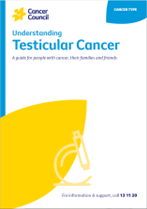- Home
- Testicular cancer
- Managing side effects
- Short-term side effects
Short-term side effects
Below we discuss the common short-term side effects of treatment for testicular cancer.
| fatigue | It is common to feel tired and lack energy while having chemotherapy or radiation therapy, particularly as treatment progresses. The tiredness often lasts for a few weeks after treatment is finished. Try doing some gentle exercise as this can help with fatigue. Plan your activities so you can rest regularly during the day. Talk to your family and friends about how they can help you. For more on this, see Fatigue. |
| stomach problems | Some chemotherapy drugs can make you feel ill (nausea) or vomit. You will usually be given anti-nausea medicine before having chemotherapy to prevent or reduce nausea and vomiting. You may be given other anti-nausea medicines to take at home in case nausea occurs. These are available in many forms, including tablets that you swallow, wafers that dissolve on the tongue and suppositories to put in your bottom (rectum). If you have radiation therapy to the abdomen, you could have some minor stomach-aches, nausea or bloating. Your doctor may prescribe medicines to prevent these symptoms from occurring or to treat them if they do occur. Make sure to tell your medical team if you still feel sick as you may be able to try a different form of medicine. |
| bowel issues | Sometimes chemotherapy drugs can affect the nerve endings in the bowel, making it hard to pass a bowel motion and causing constipation. More often, constipation occurs as a side effect of the anti-nausea medicines. Your medical team can prescribe medicines to help treat constipation. Radiation therapy sometimes causes diarrhoea and cramping. These bowel irritations are usually minor and do not need treatment, but if they are bothering you, talk to your doctor about adjusting what you eat or taking medicines. |
| bladder irritation | Radiation therapy may cause the bladder and urinary tract to become irritated and inflamed. Drinking plenty of fluids will help, but avoid alcoholic or caffeinated drinks, as they can irritate the bladder further. |
| hair loss | Chemotherapy often causes hair loss from the head and body. Radiation therapy may cause you to lose pubic and abdominal hair in the treatment area. After treatment, the hair will usually grow back. For more on this, see Hair loss. |
| peripheral neuropathy | Some chemotherapy drugs affect the nerves, causing numb, painful or tingling fingers or toes. This is called peripheral neuropathy. It can start during treatment or after chemotherapy is finished. It usually improves over 6–12 months, but is sometimes long-lasting. |
| hearing problems | Some chemotherapy drugs can cause short-term ringing or buzzing in the ears (tinnitus) and affect the ability to hear high-pitched sounds. |
| breathlessness, cough or other symptoms | Some drugs can damage the lungs or kidneys. You may have lung and kidney function tests to check the effects of the drugs on your organs. |
→ READ MORE: Long-term side effects
Meditation and relaxation podcast
Listen to more of our meditation and relaxation podcast for people affected by cancer
More resources
Dr Benjamin Thomas, Urological Surgeon, The Royal Melbourne Hospital and The University of Melbourne, VIC; A/Prof Ben Tran, Genitourinary Medical Oncologist, Peter MacCallum Cancer Centre, Walter and Eliza Hall Institute of Medical Research and The University of Melbourne, VIC; Dr Nari Ahmadi, Urologist and Urological Cancer Surgeon, Chris O’Brien Lifehouse, NSW; Helen Anderson, Genitourinary Cancer Nurse Navigator, Gold Coast University Hospital, QLD; Anita Cox, Youth Cancer – Cancer Nurse Coordinator, Gold Coast University Hospital, QLD; Dr Tom Ferguson, Medical Oncologist, Fiona Stanley Hospital, WA; Dr Leily Gholam Rezaei, Radiation Oncologist, Chris O’Brien Lifehouse and Royal Prince Alfred Hospital, NSW; Dheeraj Jain, Consumer; Amanda Maple, 13 11 20 Consultant, Cancer Council SA; Jessica Medd, Senior Clinical Psychologist, Department of Urology, Concord Repatriation General Hospital and Headway Health, NSW.
View the Cancer Council NSW editorial policy.
View all publications or call 13 11 20 for free printed copies.

